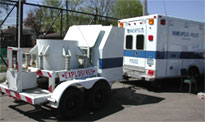 Recently, the Minnesota Workers’ Compensation Court of Appeals (“WCCA”) heard a case involving PTSD and the Minnesota Workers’ Compensation Act. Meuser Law Office Attorney Mary Beth Boyce brought a claim on behalf of her client, alleging that the employee developed post-traumatic stress disorder (“PTSD”) in the course and scope of his employment as a police officer, and as such was entitled to wage loss benefits, medical care and treatment, and rehabilitation services. The case proceeded to a formal hearing in front of a compensation judge in December of 2017. The compensation judge found in favor of employer and the insurer, denying that the employee suffered from PTSD.
Recently, the Minnesota Workers’ Compensation Court of Appeals (“WCCA”) heard a case involving PTSD and the Minnesota Workers’ Compensation Act. Meuser Law Office Attorney Mary Beth Boyce brought a claim on behalf of her client, alleging that the employee developed post-traumatic stress disorder (“PTSD”) in the course and scope of his employment as a police officer, and as such was entitled to wage loss benefits, medical care and treatment, and rehabilitation services. The case proceeded to a formal hearing in front of a compensation judge in December of 2017. The compensation judge found in favor of employer and the insurer, denying that the employee suffered from PTSD.
Attorney Boyce appealed this decision and the case went before the WCCA. Attorney Boyce alleged that the compensation judge failed to apply the correct standard under Minnesota Statute §176.011, subdivision 15(d) for claims involving mental injuries. Particularly, that the compensation judge failed to analyze the employee’s claim under the DSM-V PTSD criteria and instead summarily relied on a medical opinion that imposed additional requirements, not within the DSM-V, for a PTSD diagnosis. The compensation judge also failed to address the issue of whether the employee suffered from a personal injury or an occupational disease, due to the number of traumatic events.
The WCCA agreed with the employee. The WCCA found that Minnesota Statute §176.011, subdivision 15(d) sets forth two requirements to establish a claim for PTSD, a diagnosis made by a licensed psychologist or a psychiatrist, and second a diagnosis consistent with PTSD “as described by the most recent” edition of the DSM, which is the DSM-V. The DSM-V sets forth criteria that defines PTSD. The WCCA reasoned that while compensation judges may choose between medical experts with varying opinions as to causation and diagnoses, because of how the legislature chose to define mental injuries compensable under Minnesota Statute §176.011, subdivision 15(d), the compensation judge must apply the legal standard to the evidence. A judge may rely on an expert medical opinion, but that opinion must be consistent with the statutory requirements.
In this case, the WCCA agreed with the employee that the compensation judge erred in relying on the employer/insurer’s medical expert because he did not apply the DSM-V as is required under Minnesota Statute §176.011, subdivision 15(d). The WCCA further reasoned that while a psychologist or a psychiatrist is not bound by the DSM-V criteria in evaluating, diagnosing, or treating his or her own patients, in the context of the Minnesota Workers’ Compensation Act, a psychologist or a psychiatrist is bound by the DSM-V.
The insurer and employer appealed the WCCA’s decision to the Minnesota Supreme Court. The Minnesota Supreme Court agreed to hear the case en banc. The case is currently being scheduled for oral arguments after the party’s briefing period ends. The Minnesota Supreme Court will affirmatively decide the issue of how the compensation judges must analyze and evaluate PTSD cases. Given the rules governing how courts interpret statutes, the legislative intent, and public policy, we are cautiously optimistic that the Minnesota Supreme Court will uphold the determination of the WCCA.
Contact the attorneys at Meuser Law Office, P.A. for a free, no-obligation consultation if you or someone you know has been diagnosed with PTSD as a result of traumatic exposures at work. The attorneys at Meuser Law Office, P.A. are experienced and knowledgeable in the new area of mental injuries under the Minnesota Workers’ Compensation Act. If you are a police officer firefighter, or corrections officer, you also may be entitled to PERA or MSRS Duty Disability benefits and/or healthcare continuation benefits under Minnesota Statute §299A.465. Call us today at 1-877-746-5680.

